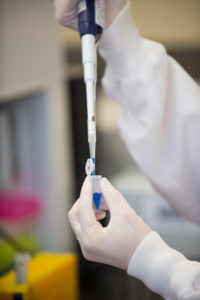
Colorado State University’s vaccine manufacturing facility, BioMARC, is developing a drug to protect U.S. soldiers from a mosquito-borne pathogen that can cause severe illness and death.
The development of a vaccine for the Venezuelan equine encephalitis virus is funded through a $3 million contract with the U.S. Department of Defense, which often supports research to protect soldiers from pathogens that are considered potential agents of bioterrorism. Research findings from projects like this one often have broad application in protecting human health.
Venezuelan equine encephalitis virus can cause fatal neurologic disease in horses and people; it is found predominantly in Central and South America, but has spread to the United States.
“The vaccines we will be producing will be used in clinical trials in humans,” said Dennis Pierro, BioMARC director and an assistant professor in CSU’s Department of Microbiology, Immunology and Pathology. “BioMARC has experience in this realm, but this is the first time in our support of the Department of Defense that we will make the vaccines for humans.”
CSU is a subcontractor on the vaccine project for Battelle, a research organization that works with the DoD’s Medical Countermeasure Systems Joint Vaccine Acquisition Program. One of the program’s requirements is to develop vaccines to protect soldiers from exposure to aerosolized viruses.
To help with this mission, BioMARC uses a state-of-the-art vaccine system called a Viral Replicon Particle that researchers believe results in improved vaccine efficacy. VRPs are new biotechnology tools that better deliver vaccines to cells and also prompt stronger immune responses.

Over the past several years, BioMARC has successfully met milestones, or completed tasks established by the DoD, for several vaccines, including those developed for Ebola and Marburg virus, and Western, Eastern and Venezuelan equine encephalitis viruses.
There are currently no licensed human vaccines or therapeutics approved by the U.S. Food and Drug Administration to combat these mosquito-borne viruses that can cause severe long-term disease and possibly death in humans.
BioMARC has previously produced products for Mycobacterium tuberculosis, human immunodeficiency virus, and West Nile virus, among other viruses and bacteria. In total, more than a dozen batches of products have been created for human use at BioMARC. A batch can contain thousands of doses of a vaccine.
BioMARC’s vaccine work is a critical part of CSU’s end-to-end response to infectious diseases that often arise in the tropics and increasingly cause devastating outbreaks. CSU, which partners with key federal agencies, provides bench science to illuminate how pathogens work at the molecular level, as well as applied and field research aimed at reducing the global burden of infectious disease.
“It is our way of returning on the public investment in education and research,” said Raymond Goodrich, executive director of the Infectious Disease Research Center at CSU, which is where BioMARC is housed. “This program is just one example of the unique capabilities of the BioMARC facility, which provides benefits to health-care communities at the state, national and international level.”
About BioMARC
BioMARC is a nonprofit Contract Manufacturing Service Unit owned and operated by Colorado State University and created to produce biopharmaceutical products for non-clinical, clinical, and commercial use under Biosafety Level 3 and Biosafety Level 2 containment and Select Agent biosecurity conditions. In addition to manufacturing and testing services, BioMARC offers product and process development services, which includes the creation of development programs focused on implementation of Current Good Manufacturing Practice regulations and scalability issues.
BioMARC is housed on CSU’s Foothills campus in the Infectious Disease Research Center.
About CSU Infectious Disease Research Center
The Infectious Disease Research Center provides a secure, state-of-the-art facility for university investigators, government scientists, and industry representatives to collaboratively research the basic biology, biochemistry, molecular biology, and epidemiology of bacteria and viruses that cause human and animal diseases. The Center provides a research environment for developing new scientific discoveries, vaccines, methods of diagnosis, and therapeutic agents for infectious agents.